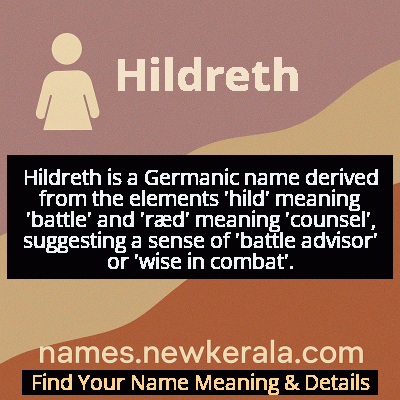Hildreth Name Meaning & Details
Origin, Popularity, Numerology Analysis & Name Meaning of Hildreth
Discover the origin, meaning, and cultural significance of the name HILDRETH. Delve into its historical roots and explore the lasting impact it has had on communities and traditions.
Name
Hildreth
Gender
Female
Origin
German
Lucky Number
3
Meaning of the Name - Hildreth
Hildreth is a Germanic name derived from the elements 'hild' meaning 'battle' and 'ræd' meaning 'counsel', suggesting a sense of 'battle advisor' or 'wise in combat'.
Hildreth - Complete Numerology Analysis
Your Numerology Number
Based on Pythagorean Numerology System
Ruling Planet
Jupiter
Positive Nature
Optimistic, inspirational, and creative.
Negative Traits
Scattered, exaggerating.
Lucky Colours
Yellow, gold, purple.
Lucky Days
Thursday.
Lucky Stones
Yellow sapphire.
Harmony Numbers
1, 2, 9.
Best Suited Professions
Arts, writing, communication.
What People Like About You
Creativity, optimism.
Famous People Named Hildreth
Hildreth of Whitby
Anglo-Saxon Abbess
Early Christian leader and educator who established religious communities in Northumbria
Hildreth Meière
American Artist
Renowned muralist and architectural artist known for Art Deco works including at Rockefeller Center
Hildreth Spencer
British Historian
Noted scholar of medieval English history and women's studies
Hildreth G. Rogers
American Educator
Pioneering women's education advocate who founded several schools for girls
Name Variations & International Equivalents
Click on blue names to explore their detailed meanings. Gray names with will be available soon.
Cultural & Historical Significance
The name's cultural resonance extends to its representation of educated women in historical contexts. During periods when female literacy and leadership were limited, names like Hildreth often appeared in religious and educational settings, suggesting that bearers were from families that valued learning and influence. In modern cultural studies, Hildreth serves as an example of how Germanic names preserved cultural values through linguistic elements, providing insights into historical gender roles and social structures. The name's survival, though rare, demonstrates the enduring appeal of names that combine strength with intelligence, making it a culturally significant choice that honors both historical traditions and contemporary values of empowered femininity.
Extended Personality Analysis
The personality traits associated with Hildreth reflect its etymological roots in both battle and counsel, creating a complex psychological profile of someone who combines strategic thinking with inner strength. Individuals with this name are often characterized by their analytical minds and their ability to remain calm under pressure. They typically exhibit a natural authority that comes not from aggression but from demonstrated competence and thoughtful decision-making. Their 'counselor' aspect makes them excellent listeners and advisors, often serving as the voice of reason in their social and professional circles. They approach problems systematically, weighing options carefully before committing to a course of action, which makes them valuable in leadership positions and crisis situations.
Beyond their strategic capabilities, Hildreths often possess a deep sense of integrity and moral conviction. They are typically principled individuals who stand by their beliefs, even when facing opposition. This moral fortitude, combined with their tactical thinking, makes them effective advocates and change-makers. While they may appear reserved or serious to those who don't know them well, they often reveal warmth and loyalty in close relationships. Their strength is tempered by empathy, allowing them to understand multiple perspectives while maintaining their core values. This balance between conviction and compassion makes Hildreths particularly effective in roles that require both leadership and mentorship, from education and counseling to management and community organizing.
Modern Usage & Popularity
In contemporary naming practices, Hildreth occupies a unique position as a historically rich but exceptionally rare choice. Current usage trends show the name appearing primarily among families with strong interests in medieval history, Anglo-Saxon heritage, or unique vintage names. According to available data, Hildreth doesn't rank in the top 1000 names in English-speaking countries and typically sees only occasional use, often as a middle name or in families continuing a specific naming tradition. The name's rarity contributes to its distinctive character, appealing to parents seeking names that are both meaningful and uncommon. Modern bearers often report that while the name requires occasional explanation, it's generally well-received for its sophistication and historical depth. The name has seen minimal influence from popular culture, maintaining its classical appeal without becoming trendy. Its usage patterns suggest it's most popular among educated, historically-conscious families who appreciate linguistic heritage and strong feminine names with intellectual connotations. Despite its rarity, Hildreth continues to be chosen by parents who value its unique combination of strength and wisdom, ensuring its continued, though limited, presence in modern naming landscapes.
Symbolic & Spiritual Meanings
The symbolic richness of Hildreth extends beyond its literal translation to encompass broader metaphorical meanings that resonate across cultural contexts. Symbolically, the name represents the archetype of the wise warrior—someone who engages with life's battles through intelligence and strategy rather than brute force. This makes Hildreth emblematic of enlightened leadership and moral courage. The battle element symbolizes life's challenges, obstacles, and conflicts, while the counsel component represents the wisdom, guidance, and strategic thinking needed to navigate these difficulties successfully. This combination creates a powerful symbol of resilience through intelligence, suggesting that true strength lies in thoughtful action rather than reactive force.
Metaphorically, Hildreth also represents the integration of traditionally masculine and feminine qualities—the strength and assertiveness associated with battle combined with the wisdom and nurturing associated with counsel. This makes the name symbolically significant in discussions about gender roles and balanced leadership. In psychological terms, Hildreth can symbolize the journey toward self-mastery, where one learns to harness both inner strength and thoughtful reflection. The name also carries connotations of protection and advocacy, representing someone who fights for causes and people through wise guidance and moral support. In spiritual contexts, Hildreth might symbolize the soul's journey through earthly challenges guided by higher wisdom, making it a name with deep philosophical and metaphorical resonance that transcends its historical origins.

